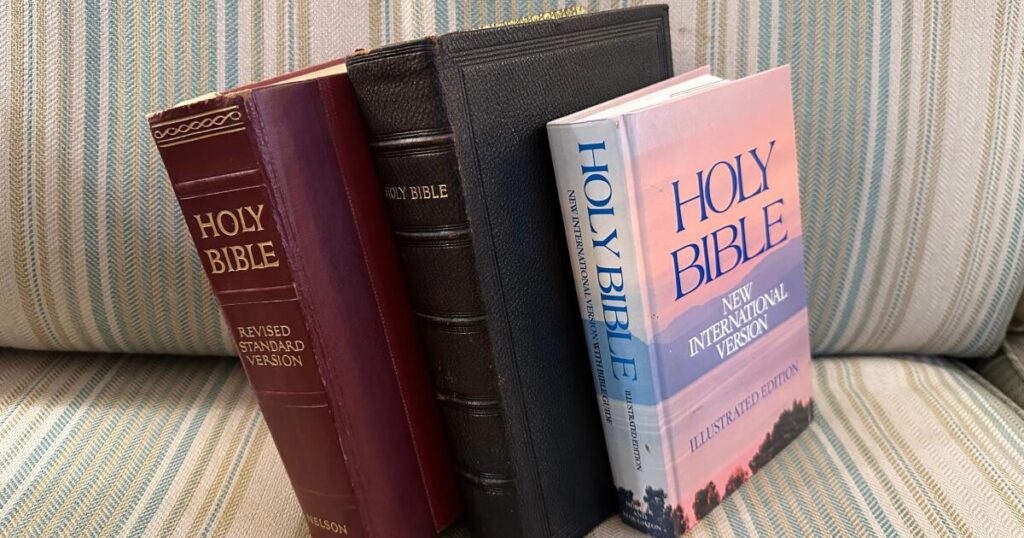Many Americans may have lost faith in organized religion, but according to recent data, they still love the Good Book.
As of September, Bible sales were up 11% this year over 2024, part of a continuing boom in Bible sales. That includes 2.4 million sold in September as part of a surge that coincided with the death of conservative Christian activist Charlie Kirk, according to data from Circana, a company that tracks book sales. All told, more than 18 million Bibles have been sold so far this year.
“Sales for Bibles have been steadily growing in the U.S. since 2021 and have set unprecedented annual sales records since 2022,” Brenna Connor, an industry analyst at Circana BookScan, told Religion News Service in an email. “2024 marked a 20-year high for Bible sales in the U.S., and 2025 is on track to surpass these levels, underscoring the growing interest in religious content among U.S. consumers.”
Among the bestsellers are an economy version of the English Standard Bible — the top seller, according to Circana — the Adventure Bible for kids and the She Reads Truth Bible, named for an online community of Bible-reading women. A pink, giant-print King James Version gift Bible has been a bestseller for years. And Donald Trump earned more than $1.3 million last year for endorsing a patriotic Bible named for country singer Lee Greenwood’s song “God Bless the USA.”
While publishers can track how many Bibles are sold, they don’t have demographic details of the buyers. But Tim Wildsmith, a former college campus minister turned author and Bible YouTuber, wonders if the tumult of the last five years, from the COVID-19 pandemic to the current political polarization, is playing a role.
With the world going crazy, he said, folks may be looking for something they can rely on.
“Part of me wonders if people are just looking for something to kind of settle themselves — that spiritual looking for peace, whatever you want to call it,” he said.
At the Christian Connection bookstore in Sycamore, Ill., a town west of Chicago, the most popular version of the Bible is the New Living Translation, or NLT, especially its editions that pair with a new app from Tyndale, the NLT’s publisher. That translation is easy to read, and the app, known as Filament, makes it easy for readers to access study materials to help understand the text, said Kelli Malm, who runs the store with her mother.
“People want the readability, especially if they’re new Christians, and if they’re younger, they can use an app,” she said. “It’s kind of a no-brainer situation for people — they’ve got a Bible and carry it around with them, and they don’t have to necessarily grab the big study Bible.”
The store has seen an uptick in sales since September, and at least one buyer said Kirk’s death prompted them to go back to church, Malm said. She said that before September, she had no idea who Kirk was, but that God can take something terrible and redeem it.
While most people who buy Bibles at the store are older, she has also seen an uptick in customers in their 30s and 40s. “They’ve just found their faith, or they’re coming back to it,” she said.
Amy Simpson, the Bible publisher for Tyndale House Publishers, which publishes the NLT, said no one kind of Bible is driving the growth of sales, but they are seeing growth across the board.
That’s one reason publishers offer so many kinds — different versions can appeal to people of all ages. And having so many editions of the Bible has made it easier for publishers to keep up with demand, said Melinda Bouma, a HarperCollins Christian Publishing vice president and Bible publisher for Zondervan. If one version sells out, there are many other options.
HarperCollins publishes 22 translations of the Bible in English and Spanish, in hundreds of editions. Bouma said Bible sales are up for all kinds — including kids’ Bibles.
The Jesus Bible, an edition aimed at Gen Z readers, is also doing well, Bouma said. She has seen data showing renewed interest in faith among younger folks, and some of that interest seems to be showing up in Bible sales.
The American Bible Society’s annual State of the Bible report found that about 41% of Americans qualify as “Bible users,” meaning they have read the Bible at least three times a year outside of church services. That’s up from 38% last year but down from 2021, when 50% of Americans fit that category.
The report also found that 36% of Gen Z and 39% of millennials would qualify as Bible users — an increase for millennials over 2024, when 30% were identified as Bible users. Only 1 in 5 Americans would qualify as what the Bible Society calls “Scripture engaged,” meaning the Bible has a major role in their lives.
Despite the boom in Bible sales, a recent survey from Gallup released Nov. 13 found that less than half of Americans (49%) say religion is important to their lives, part of a continued documented decline in religiosity.
Smietana writes for the Associated Press. This content is written and produced by Religion News Service and distributed by the Associated Press.
The post Bible sales keep growing, even as many Americans lose their religion appeared first on Los Angeles Times.




